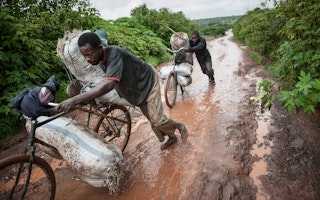In an Age of Crisis, an Opportunity to Remake the EU
By Goran Buldioski

With a Russian aggressor invading a sovereign European country, growing populism and division across the continent, and a climate crisis that is accelerating amidst political gridlock, there seems to be little to celebrate on this Europe Day. The European Union and its institutions find themselves playing catch-up in a perpetual state of emergency, often responding insufficiently to the many challenges we face.
We stand at a crossroads for the EU—one that is centered on foreign policy. Can a group of democracies work together to address the fundamental global challenges through systems of multilateral cooperation? Or are we destined for a world where competing autocrats fight to protect narrow national interests as the planet burns around them?
For a long time, global multilateral institutions have been looked to for solutions but have too often failed to respond with the necessary urgency, innovation, and scale. It is becoming increasingly apparent that it is up to regional blocs to step into the gap left by these institutions. The European Union must take on this role courageously, as a bloc and not as a desynchronized group of individual actors.
The past has shown that whenever the EU was hesitant, others filled the void. In today’s world, the EU cannot afford the same mistakes. Neither can it count on hammering its way through. The outside pressures are too big to only look inside. A much more cooperative approach is needed that takes into account the interests of others, especially those of the developing world. The EU must be clear about what it can offer to international partners in finding long-term solutions.
The European project was at its best when it took bold steps towards enlargement in the 2000s. Or when it pushed to advance the freedom of its common markets of goods, people, services, and capital. Or, more recently, when it moved beyond the current toolkit to invent the NextGen financial package as a collective response to address the COVID-19 crisis. However, what may have worked in the past will not be the prescription for the way forward.
What is the next big thing the EU wants to achieve? There is great urgency to improve decision-making, clarify roles, strengthen our voice—and rethink what the EU should be, not only within but in relation to the rest of the world. This requires not only better processes but also much more resolute and courageous leadership.
How to get there?
First, EU foreign policy must stand on a much broader and more legitimate base. One way is for the heads of states and governments to agree on a broad strategic guidance document with a comprehensive understanding of the complex risks and threats of today and tomorrow. It would be updated annually and developed in a collaborative process with European and national parliaments, consulting with a range of experts—certainly not behind closed doors, as is the current practice. To bring the document to life and act upon it, the EU should grant greater power to its representatives to interact with international partners and enable them to take more decisive action to further European goals on the global stage.
Second, the EU’s ability to be a reliable and equal partner rests on its ability to be flexible and quick. Its institutions should be willing to learn and grow from mistakes rather than avoid risk and resort to the lowest common denominator in every foreign policy decision. It cannot afford to stick to the notoriously cumbersome European consensus-building. If it wants to be a global player, the EU must lead the way with decisive and ambitious systemic solutions. It must change gears and speed up decision-making processes. Instruments such as constructive abstention and emergency break procedures can reassure member states who fear for their national sovereignty.
Third, each EU member state, as well as EU institutions, must ask themselves what sovereignty can still mean in this age of crisis. The worries of some member states over protecting national sovereignty must, of course, be taken seriously. At the same time, it is important to acknowledge that on most issues, the EU as a bloc provides a safer room. Too much energy and time is wasted on worrying about the EU eating into national decision-making. It is high time to focus on how Europeans can come together and shape global developments. No document or process can replace true collaboration and a willingness to tradeoffs and compromises to agree on important policies.
Lastly, if the EU wants to increase its influence, it needs to critically assess and lessen its dependencies on others. Russia’s assault on Ukraine has led to important steps with regard to energy security, but more changes need to be made to strengthen Europe’s economic security—not only to protect European economic competitiveness but to ensure its capacity to act boldly. That includes avoiding overdependence on the United States and on China. Likewise, speeding up the implementation of its “green energy plan” will lessen its dependence on regional authoritarian powers such as Saudi Arabia and Qatar. We have seen how vulnerable economic ties and dependencies can make us and how easily they are weaponized. If member states are not to respond by resorting to national strategies, the EU needs to offer convincing European solutions.
Only when these deficits are addressed can the EU tackle current and future crises with a strong voice and decisive action. And that is what we need if the EU is to survive and thrive as a truly open society—a place where governments are held accountable, and citizens have a say in the way they’re governed—and become a key reference for the rest of the world of what prosperity and good governance look like.

Goran Buldioski is acting executive director of Open Society–Europe and Central Asia.


